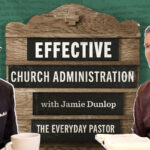Have you ever read the New Testament and wondered if the apostles would’ve passed a contemporary hermeneutics course? Sure, they quoted and alluded to the Old Testament, but carefully considering the original context just wasn’t very high on their priority list.
Or was it?
More than two decades ago, Greg Beale wrote a brief article for Themelios (the entire archives can be accessed for free at TGC) titled “Did Jesus and His Followers Preach the Right Doctrine From the Wrong Texts? An Examination of the Presuppositions of Jesus’ and the Apostles’ Exegetical Method.” Ponderous title aside, Beale’s article forcefully contends that the New Testament authors in fact did interpret the Old Testament in a hermeneutically responsible manner—indeed, one we ought to emulate.
Sloppy Exegetes?
It’s commonly assumed the New Testament authors paid paltry regard to the context surrounding their passages of choice. “With all due respect,” the thinking goes, “it sure seems they treated Scripture like a gigantic grab bag from which to cherry-pick whatever suited their needs at the moment.” Nevertheless, it’s maintained, “Even if their Old Testament excursions were exercises in missing the contextual point, the infallible end justifies the exegetically sloppy means.”
Beale objects to this reasoning. “The proposal of many that the NT’s exegetical approach to the OT is characteristically non-contextual is a substantial overstatement.” He continues:
I remain convinced that once the hermeneutical and theological presuppositions of the NT writers are considered, there are no clear examples where they have developed a meaning from the OT which is inconsistent or contradictory to some aspect of the original OT intention.
Beale also challenges the popular notion that since the apostles were inspired by God, we shouldn’t emulate their methodology:
It is not necessary to claim that we have to have such inspiration to reproduce their method or their conclusions. The fact that we don’t have the same “revelatory stance” as the NT writers only means that we cannot have the same epistemological certainty about our interpretive conclusions and applications as they had. Exegetical method should not be confused with certainty about the conclusions of such a method, since the two are quite distinct.
In other words, the idea that the New Testament writers’ supposed exegetical freedoms were a function of divine inspiration fails to convince. These guys weren’t “irresponsible yet inspired.” Emulating apostolic interpretation isn’t somehow conditioned on sharing apostolic inspiration. No, the reason their exegetical approach ought to be reproduced is because it was faithful. The apostles were models of “rightly handling the word of truth” (2 Tim. 2:15)—and not just because they were penning infallible sentences.
Christmas Test Case
So what does this look like on the ground? In Matthew 2, having just learned of Herod’s scheme to massacre every Bethlehem male under the age of two, we read in verses 17–18:
Then was fulfilled what was spoken by the prophet Jeremiah: “A voice was heard in Ramah, weeping and loud lamentation, Rachel weeping for her children; she refused to be comforted, because they are no more.”
It’s important to note that the quoted verse, Jeremiah 31:15, is situated in a setting of hope. In fact, it’s the lone note of doom in a symphony of grace. Taken as a whole, Jeremiah 31 is a complex of promises revealing what God will do in the future for his soon-to-be-exiled people. Judgment won’t be the last word. There will be life after Babylon when he returns them to their land, restores their fortunes, and grants them hearts to obey.
Ramah, a little town about six miles north of Jerusalem, was the site where the Jewish captives were rounded up before their death march to Babylon. To the Jews, then, it came to represent a place of heart-wrenching agony. Ramah was where friendships got ripped asunder, where husbands gazed on their wives for the last time, where children were pried from the fingers of wailing mothers. As the idealized mother of Israel, Rachel weeps over the impending slaughter of her descendants at Babylonian hands.
The question of whether New Testament apostles would pass a contemporary hermeneutics course may have more to say about our hermeneutics than theirs.
But why does Matthew grab Jeremiah 31:15 to make sense of the Bethlehem massacre? It’s not as if that verse is a prediction—it isn’t even in the future tense. How, then, can he see it finding fulfillment in the events surrounding Herod’s holocaust?
On one level, the verse is no doubt a poignant reminder that God works to bring blessing through disaster, life through death. Just as the horror of Jeremiah 31:15 is planted in the soil of future hope, so Matthew’s readers can rest assured that Herod’s murderous machinations will finally fail. The newborn King will be spared.
But is that it? Does Matthew simply want us to assure us that God will bring blessing out of bereavement?
I think there’s a bit more going on. Matthew understands Israel’s long exile—her banishment because of sin—to have finally reached its climax. The end is now in sight. Indeed, Rachel’s weeping is about to cease, for God’s Messiah has finally come to bring an end to Israel’s—and humanity’s—exile from God’s favor and blessing.
Matthew is showing us that the King is on the scene to bring God’s people home, and no human monarch can stop him. Jeremiah 31:15 was couched in the hope that God wouldn’t leave his people in exile forever. In Jesus he has arrived to accomplish that homecoming—not simply from Babylon to Israel, but from judgment to forgiveness and from death to life.
The tears of the exile, then, are finally being “fulfilled,” for the tears begun in Jeremiah’s day reach their climax in the tears of the mothers of Bethlehem. David’s royal heir has arrived, the exile is ending, and God’s true Son will soon inaugurate the new covenant promised in Jeremiah 31.
Hope Fulfilled, Tension Relieved
So does Matthew play fast and loose with the Old Testament in order to suit his purposes? No. Rather, he’s showing his readers how Jesus Christ fulfills all the hopes and relieves all the tensions of the Old Testament and the history of Israel.
The question, then, of whether a New Testament apostle would pass a contemporary hermeneutics course may have more to say about our hermeneutics than the apostles’.
To learn more about these complex issues, I’d recommend the Beale-edited volume, The Right Doctrine from the Wrong Texts?: Essays on the Use of the Old Testament in the New (Baker, 1994), as well as the comprehensive commentary, edited by Beale and D. A. Carson, Commentary on the New Testament Use of the Old Testament (Baker, 2007). The latter work deals with every NT text in which the OT is quoted or clearly alluded to.
Download your free Christmas playlist by TGC editor Brett McCracken!
 It’s that time of year, when the world falls in love—with Christmas music! If you’re ready to immerse yourself in the sounds of the season, we’ve got a brand-new playlist for you. The Gospel Coalition’s free 2025 Christmas playlist is full of joyful, festive, and nostalgic songs to help you celebrate the sweetness of this sacred season.
It’s that time of year, when the world falls in love—with Christmas music! If you’re ready to immerse yourself in the sounds of the season, we’ve got a brand-new playlist for you. The Gospel Coalition’s free 2025 Christmas playlist is full of joyful, festive, and nostalgic songs to help you celebrate the sweetness of this sacred season.
The 75 songs on this playlist are all recordings from at least 20 years ago—most of them from further back in the 1950s and 1960s. Each song has been thoughtfully selected by TGC Arts & Culture Editor Brett McCracken to cultivate a fun but meaningful mix of vintage Christmas vibes.
To start listening to this free resource, simply click below to receive your link to the private playlist on Spotify or Apple Music.


































